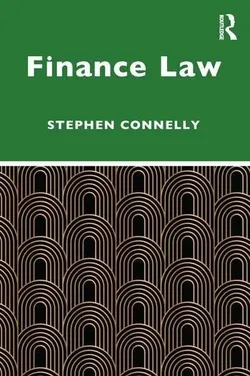Warwick Law School News
Warwick Law School News
The latest updates from our department
Professor Stephen Connelly launches new book on Finance Law
 The Centre for Law, Regulation and Governance of the Global Economy (GLOBE) will be hosting a book launch of Finance Law by Professor Stephen Connelly on Thursday 20 November 2025 at 5pm in S0.11 at Warwick Law School.
The Centre for Law, Regulation and Governance of the Global Economy (GLOBE) will be hosting a book launch of Finance Law by Professor Stephen Connelly on Thursday 20 November 2025 at 5pm in S0.11 at Warwick Law School.
Professor Stephen Connelly’s Finance Law is a textbook designed for LLM and advanced LLB students with an interest in applications of private law to modern financial transactions. Based on five years of post-qualification experience and over a decade of legal teaching, the book sets out to explain what finance is trying to achieve and what it demands from the law to achieve it. The focus of the text is the London Form of syndicated credit agreement – the core contractual basis for a multiplicity of transactions, from corporate financings to leveraged buyouts, from real estate finance to commercially-funded sovereign debt. Time is taken to explain why financial contracts are designed the way they are, and what stresses financial demands place on supposedly settled principles of private law.
The event will be followed by a drinks reception and welcome discussants Dr Andreas Kokkinis, Associate Professor of Birmingham Law School, University of Birmingham and Dr Karina Patricio Ferreira Lima, Senior Lecturer of Leeds Law School, University of Leeds.
We caught up with Stephen to find out a little more about him, his time at Warwick and his research.
Can you provide a brief overview of your academic background and professional experience in the field of law?
I am a solicitor (England & Wales) and have been a member of the Frankfurt am Main bar too. My career in practice started at Lawrence Graham (now WLG Gowling) in commercial and financial litigation, and shifted with the times first into financial regulation, including investigations, and then into finance proper as a structured finance lawyer at A&O in Frankfurt am Main.
Academically, I use my financial knowledge both in empirical articles addressing developments in finance law, and in advising NGOs and governments on aspects of sovereign debt. There is currently a Bill going through the UK Parliament which I drafted with Prof Celine Tan and Dr Karina Patricio Ferreira Lima which supports international debt relief measures.
How long have you been in your role at Warwick Law School and what motivated you to pursue a career in academia?
I have been at Warwick for over 10 years now, and I was here as an undergraduate long before that, too. My personal tutor was the fantastic Graham Moffat (he taught trusts wonderfully). It was he who encouraged me to become an academic and was slightly peeved when I did not straight away. I went into practice, but especially at the start, when I was a litigator, I had time to read all the books I wanted to read and determine the kinds of questions I wanted to explore.
How would you describe your teaching philosophy?
In one word: ‘Warwick’. Ideally, I want to be presenting not siloed bits of legal doctrine but real-world problems. No client walks in off the street and says ‘Please tell me about making claims against parent companies but please restrict yourself to company law’. No, they come in because perhaps they are the victim of pollution but the profit from the activity that caused the pollution has long since reached a parent corporation sitting in another jurisdiction. We need to teach students the basics, yet we want to get them to a position where they look at this problem and start pulling together their often-contradictory legal knowledge to tackle this problem. The context demands a multifaceted approach to law. The student might realise company law does not help, but perhaps the law of tort will. And what about environmental laws, or a claim under the law of another jurisdiction?
I want students to develop this facility with the legal categories; to be able to move between them like someone who can describe the same world through different languages. One result is, they see the contingency of these legal languages, and so of how they are limited and could be different.
 Are there any emerging legal issues or trends that you find particularly fascinating, and do you incorporate these into your teaching or research?
Are there any emerging legal issues or trends that you find particularly fascinating, and do you incorporate these into your teaching or research?
Back in 2016, I published an article on private credit. The basic thesis was that post-2008 regulation had focused on making big banks safe, but finance was now being rerouted through private equity, and so these flows were under the supervisory radar. The article went nowhere on publication; it was one of those cases of shouting ‘look over here!’, but everyone was still focused on old problems. Anyway, since 2021 or so supervisors have started to wake up, and some academic papers have followed. They now realise that non-bank credits are indeed a real issue, especially as it turns out the big banks are using private equity as a front to pass through finance indirectly to debtors they might not be able to fund directly. The question now is, if those debtors default, will those losses start appearing on bank balance sheets (eventually yes) and how big will they be?
A related issue is that the private equity firms and their investors know they are holding onto debt of less than stellar quality. For a while know these funds have simply been moving the debt around between themselves to generate an illusion of demand. In the last two years, however, there has been a huge push by the likes of Blackrock to offload some of this debt to retail customers in the form of ELTIFs and similar products. There is real potential there for some serious damage to be done both to retail investors (who are locked in by these products) and also to any appetite to invest in smaller companies which are usually the borrowers in this case.
How do you stay updated on developments in the legal field?
When Warwick Law School was founded, the first Head, Geoffrey Wilson, held up a copy of the Financial Times and said he expected students to be able to read it by the end of the degree. What I have tried to demonstrate in my book is that if you really want to be ahead of developments in the legal field, you should really be looking at the financial context, because it is here that we find the real sources of legal change. Take the law of derivatives for example: no one can seriously explain what is going on there as a legal development; if anything this law is an aberration in so many ways. Yet understand the financial context and one can see the sheer pressure being placed on legislators and judges to condone transactions which hitherto they had regarded as unjustifiable.
Looking at finance law from this angle helps one avoid that great sin of legal academia: the post hoc rationalisation (and so intellectual justification) of highly questionable legal developments.
Do you feel that the area of law you specialise in is widely recognised? Do you consider it a niche?
Finance law is very strange in this regard: students spend a huge amount of time studying contracts, awards of damages, fraud and so on, but no textbook ever asks: ‘what even is it to pay someone?’ The core of finance is payment, and that means a deep analysis of indebtedness, satisfaction of debt, and the nature of money and money equivalents. There is a huge amount to be investigated here that is central to our understanding of what is happening in the core legal fields, but which is passed over as if the law of money and debt is as natural as breathing.
So, we have a critical thought here: how has legal knowledge been so structured that it makes the law of money and debt a niche subject? What is the function of this relegation of finance law to the periphery? In my textbook I indicate that we have some very big questions to deal with once we look beyond ‘Foundational Legal Knowledge’.
For more information on the book launch please see the GLOBE websiteLink opens in a new window.
